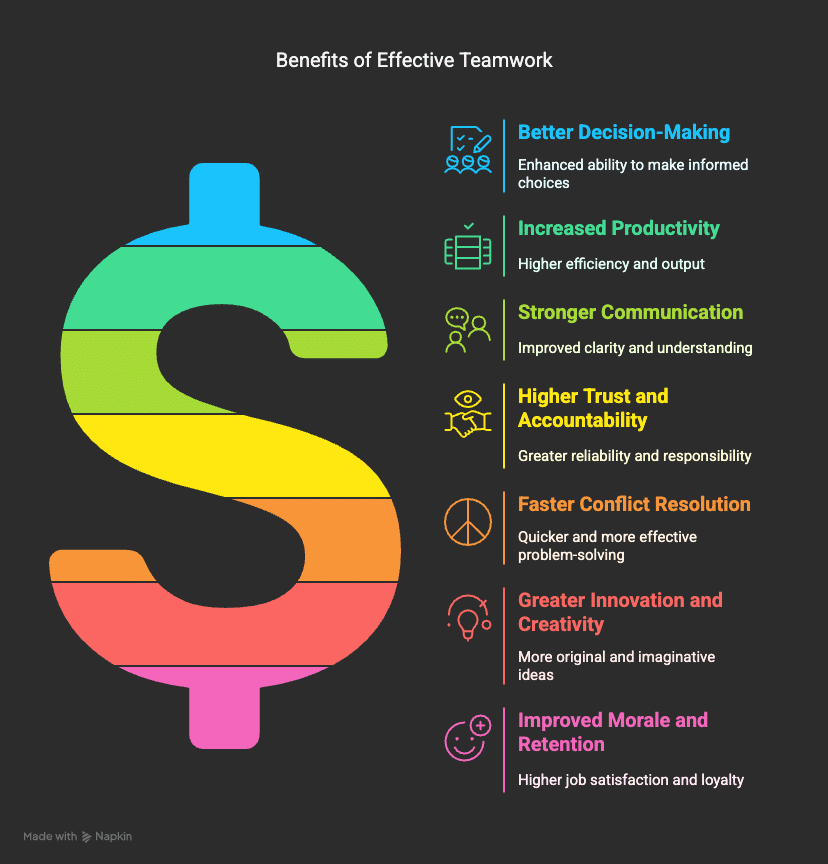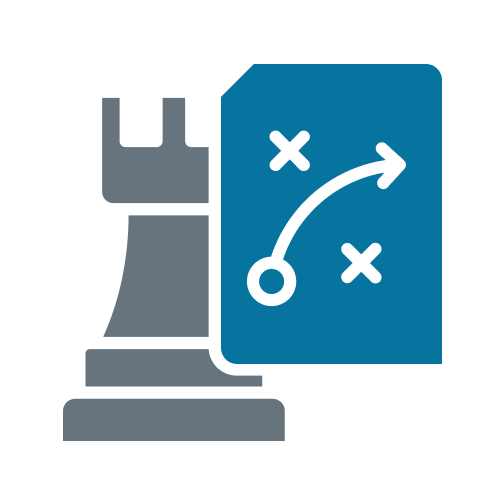The benefits of an effective team don’t show up in press releases. They show up in quarterly results, culture surveys, and retention stats. Great teams don’t just complete tasks — they create clarity, momentum, and trust. They make leadership easier and execution faster. That’s the power of team leadership coaching.
At Champion PSI, we’ve worked with executive teams across industries. And while every organization is different, the benefits of an effective team are always the same: more alignment, better performance, fewer fires.
In this blog, we’ll break down the seven most important benefits of an effective team — and why they matter more than ever in today’s fast-moving business environment.
Overview: What You’ll Learn
This blog explores seven key benefits of an effective team and how each one directly impacts business performance:
- Better decision-making
- Increased productivity
- Stronger communication
- Higher trust and accountability
- Faster conflict resolution
- Greater innovation and creativity
- Improved morale and retention
Let’s unpack each.

1. Better Decision-Making
Effective teams bring diverse perspectives into the room — and actually listen to them. This doesn’t slow decisions down. It sharpens them. When ideas are challenged respectfully, blind spots get exposed early, and stronger solutions emerge.
We’ve seen teams go from reactive and siloed to unified and strategic simply by increasing psychological safety. When people feel safe to speak up, leaders stop flying blind.
This benefit of an effective team is foundational: better input, better output. As McKinsey & Company notes, CEO decision strategies are evolving to include more collaborative, high-trust inputs.
2. Increased Productivity
An effective team is a productive team — but not because people are working longer hours. It’s because energy isn’t wasted. There’s less duplication of work, fewer dropped balls, and clearer roles.
When team members understand what’s expected and trust that others will deliver, everything flows smoother. Meetings become shorter. Execution speeds up. Deadlines get met. That’s the mark of building a winning team.
This is one of the most immediately visible benefits of an effective team: less friction, more output. Forbes confirms this in their research on leadership levers that drive performance.
3. Stronger Communication
Most dysfunction in organizations can be traced back to unclear or inconsistent communication. Effective teams solve this.
They don’t rely on assumptions. They check in, clarify, and adjust in real time. There’s a shared language and rhythm, which reduces misunderstandings and keeps everyone aligned. That’s how you improve communication skills that actually last.
This benefit of an effective team becomes especially powerful during change or pressure. When stakes are high, teams with strong communication don’t unravel. They recalibrate.
The impact on leaders? Less firefighting. More forward momentum.
4. Higher Trust and Accountability
You can’t coach performance if you don’t have trust. And you can’t build trust without consistency. Effective teams show up — for the work, for each other, and for the mission.
In high-trust teams, people follow through because they don’t want to let each other down. Accountability becomes peer-driven, not top-down. Feedback gets shared without drama. And performance issues are addressed early, not buried.
This is one of the most underrated benefits of an effective team: emotional maturity. If you’re a CEO struggling with hidden tension on your team, check out coaching that builds executive trust.
5. Faster Conflict Resolution
Conflict isn’t a sign of dysfunction — avoiding it is. Effective teams don’t eliminate conflict. They get better at navigating it.
Disagreements happen. But in strong teams, they don’t spiral. People speak directly, resolve quickly, and move forward without residual resentment. That’s because the foundation of trust and communication has already been built.
The benefit here is operational: faster decisions, fewer delays, no lingering drama.
And culturally? It creates a climate where truth is welcome, not weaponized. Gallup confirms in their team effectiveness research that transparency is key to scalable leadership.
6. Greater Innovation and Creativity
Innovation doesn’t come from brainstorming retreats. It comes from teams who feel safe enough to say what they’re actually thinking.
In effective teams, people aren’t afraid to pitch unconventional ideas or challenge the status quo. They know they won’t be dismissed, shamed, or ignored. That’s what drives team innovation insights at every level.
This benefit of an effective team becomes a competitive advantage. New ideas emerge organically, not just from leadership. And the best solutions come from within — not consultants or heroics.
7. Improved Morale and Retention
People don’t leave bad companies. They leave bad teams. Or more specifically, teams where they feel unseen, unsupported, or stuck.
An effective team creates a sense of belonging and growth. People want to contribute because they feel valued. They trust their leaders. They enjoy working with their peers. And they can see a path forward.
This benefit of an effective team pays off in retention, engagement scores, and long-term loyalty. It also makes recruiting easier. Great people want to work with great teams. As characteristics of a strong team show, cohesion and accountability drive retention.
Real-World Example: Atlassian’s High-Trust Team Culture
Atlassian, a global software company, attributes much of its growth to an intentional focus on team effectiveness. Their open team model promotes transparency, shared goals, and active knowledge-sharing across departments.
One standout strategy? Their “Team Playbook,” a public-facing resource of workshop tools designed to improve collaboration, alignment, and trust. These tools are used internally by leadership teams and externally by customers.
By equipping teams to work better together — not just harder — Atlassian has consistently outperformed industry benchmarks in innovation, product adoption, and employee satisfaction.
Read the full case: The Importance of Teamwork (As Proven by Science)
FAQ: Benefits of an Effective Team
What are the benefits of an effective team?
Effective teams create better decision-making, productivity, communication, and morale. They help organizations move faster with less friction and more trust.
What are 10 benefits of teamwork?
Top 10 benefits include better problem solving, creativity, reduced stress, stronger relationships, improved communication, trust, accountability, innovation, morale, and retention.
How do effective teams help leaders?
They reduce leadership drag. When a team functions well, leaders can focus on strategy rather than firefighting or micromanaging.
Can team effectiveness be measured?
Yes — through engagement scores, retention rates, productivity metrics, and leadership 360s. What gets measured can be improved.
How do I build a more effective team?
Start by improving clarity, trust, and communication. Coaching, assessments, and structured feedback loops are often the fastest way to accelerate team dynamics. Learn how to develop leadership competencies across your organization.
7 Benefits of an Effective Team You Can’t Afford to Miss: Conclusion
The benefits of an effective team don’t come from charisma or chemistry — they come from commitment, clarity, and consistency. Great teams aren’t born. They’re built.
If you want stronger performance, start with stronger teams. Harvard Business Review’s leadership coaching best practices points to a truth in the game of business and life: when you get the team right, everything else follows.
Ready to get started? Book a free 30-minute call with an expert coach to explore how the benefits of an effective team can support your goal










